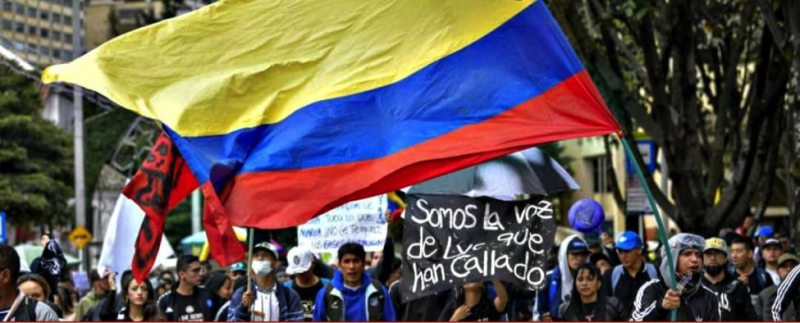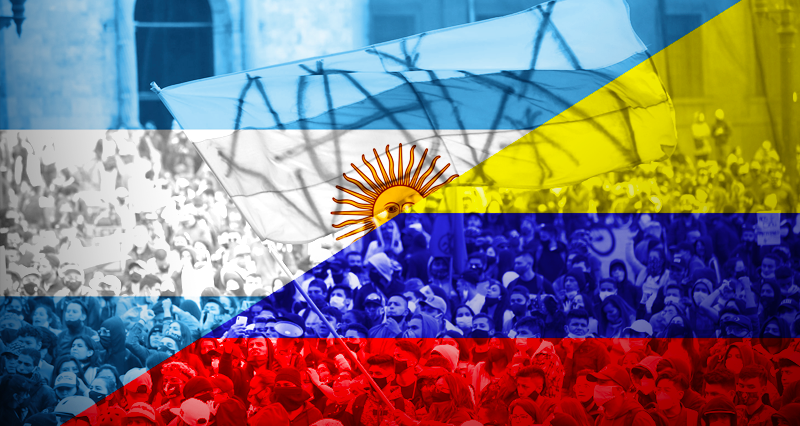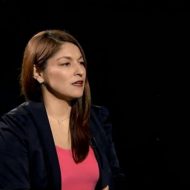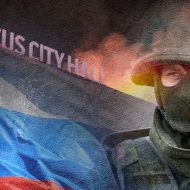In the first days of April 2021, the President of Colombia, Iván Duque, announced a new tax reform, which he tried to disguise under the name of the Sustainable Solidarity Law, in an already common act of the national and international right that, making use of the political and historical language of the revolutionary processes at the global level, utilizes “popular discourse” although in reality its aims are purely reactionary.
Colombia, after more than a year of quarantine, was already in one of its worst socio-economic moments, because, in addition to being the most unequal country in the most unequal region in Latin America (only surpassed by Brazil), the majority of its population works in the battered informal economy.

The main social, political and economic actors in the country, including the largest unions, called for a National Strike to protest against the Duque Administration. The General Strike began on April 28, and quickly gave rise to a social outbreak that had repercussions throughout the New Granada nation, especially in the large cities: Bogotá, Medellín and Cali. The Duque government responded to the protests with the well known repressive tactics (what we might otherwise call murderous) of the Colombian state. So far, different Human Rights organizations have denounced about 1,200 cases of police abuse and 30 fatalities during the protests, reaffirming Colombia as a parricidal state. At the same time, this has brought a strong rejection from the international community.
International impact: Germany (Bundestag)
On May 5, 2021, the international voices that have repudiated the state terrorism of the Duque Government, were joined by the deputies of the Bundestag (Federal Parliament of Germany), who officially spoke about the Colombian crisis:
“Reports agree that there was excessive use of force against peaceful protesters, and even in cases of acts of vandalism or violence by protesters, action to contain them was far beyond reasonable.”
“In addition, there were threats and attacks against human rights observers who wanted to document the course of the demonstrations. Although they were perfectly identified, they were attacked, as in the case of the observation mission in Cali, in which representatives of the Office of the United Nations High Commissioner for Human Rights also participated.”
Likewise, the deputies of the German parties “The Greens”, “The Left”, the Social Democratic Party (SPD) and the Christian Democratic Union (CDU), a political group of Chancellor Angela Merkel, maintained that “As members of the German Parliament we are committed to the peace process in Colombia for years and we hope that the implementation of the agreement will soon bring sustainable peace to their country.”
Statement of Argentine President Alberto Fernández in the face of State violence experienced by the Colombian people
In this dramatic photograph, the message of the Argentine Head of State, published on his Twitter account on Thursday May 6, is framed:
“With concern I observe the repression unleashed in the face of the social protests that occurred in Colombia. I pray that the Colombian people return to social peace and I urge your government to, in keeping with human rights, cease the unique institutional violence that has been carried out,” said Fernández.
It was to be expected that the Argentine President, as sensitive as he is to Human Rights issues, would openly speak out about the situation of violence in Colombia, and, in this sense, he will certainly support the reports of the Office of the High Commissioner for Human Rights. To do so is to maintain consistency in his international performance. Not having done so, he would show that he has a biased position, for example, in relation to the Bolivarian Republic of Venezuela.
However, it is interesting that his message came after the official pronouncement of the aforementioned legislators of the German Parliament. It is well known that the Argentine president has high affinity with the political positions of Chancellor Angela Merkel, and that he has taken her as a reference before various international issues, for example, Fernández has praised Merkel, for her handling of the appearance of the coronavirus and also has highlighted “the rigor” of the chancellor and the German people to deal with conflicts. So, if incentive was needed to make the decision, we believe that the letter from the Bundestag was what ended up convincing the Argentine president to speak in favor of the Colombian people.
Similarly, it must be borne in mind that next week, the Argentine President will visit, as part of an international tour of several European states, Pope Francis, in the Holy See. In this case, it seems appropriate that Fernández spoke out about the violation of Human Rights in Colombia, since the Vatican did the same, although not specifically about the events that occurred after April 28. In fact, the letter is dated one month before the General Strike, on March 28, 2021, and was sent “at a time when Colombia is experiencing an escalation of tension between various sectors of the country in the context of the social crisis. unleashed by the pandemic”, and continues:
“Upon receiving the sad news of the repeated acts of violence suffered by the inhabitants of the southwestern Pacific region of Colombia (…), the Holy Father reiterates his firm disapproval of these episodes of violence and expresses his closeness to the people who are in the middle of so much suffering.” The document is addressed to the president of the Episcopal Conference of Colombia, Monsignor Óscar Urbina Ortega.
Another political conflict between Fernández and Duque
In an area that might seem less political and more banal, but that actually touches the emotional chord of both Argentina and Colombia, on April 20, Fernández proposed, given the advance of the second wave of the coronavirus, the suspension of the Copa América 2021, which this year should be organized jointly between the aforementioned South American countries. The position of the New Granada president was totally opposite and he ruled out suspending the biggest soccer tournament in Latin America again.
“I do not want to frustrate the spectacle of the Copa América, but I want us to be very sensible. We have some time ahead to analyze and see how things evolve, see how we can control the problem,” said Fernández.
For his part, Duque said that: “I have a very clear commitment to Conmebol and we have said that we are prepared for the Copa América to be played in Colombia, with biosafety guarantees.”
In addition, the Colombian president raised his criticism of his Argentine counterpart: “It would be illogical if a national tournament and the Copa Libertadores de América could be played and five teams could not play in a safe environment, in a bubble,” he said, referring to the competitions in which Argentine soccer teams actively participate.
At this political junction, the line of the powerful South American Football Confederation (Conmebol) has been imposed: The Copa América 2021 will be held from June 13 to July 10 for the first time in Argentina and Colombia.
Reactions to the pronouncement of Alberto Fernández and the Bundestag
The Colombian Foreign Ministry reacted on the morning of May 7 with a series of tweets in response to the Argentine President, they argue:
“Foreign Ministry, on behalf of the Government of Colombia, firmly rejects the statements of President Alberto Fernández, who are unaware that thousands of Colombians have had, in accordance with our rule of law, all the guarantees to exercise peaceful protest throughout the country …”
“… And that the National Government has convened and is carrying out dialogues with all sectors of the country. Colombian democratic institutions protect the constitutional rights of Colombians …”
“And it will not be discredited by this type of pronouncement that, in addition to being an arbitrary interference, seeks to feed the polarization that does not contribute to coexistence and consensus.”
It should be noted that the Colombian government also responded to the letter from German parliamentarians, it did so through the Colombian Ambassador in Berlin, Hans-Peter Knudsen, in a letter addressed to the German deputy Uwe Kekeritz of the Green Party wrote:
“Colombia is a state of law, with solid democratic institutions, separation of powers and independent control bodies. I reiterate the firm commitment of the Government and all the institutions of the Colombian State with the constitutional right to peaceful protest and full respect for Human Rights. This commitment has been evidenced in the last nine days, in which thousands of Colombians have held free and peaceful rallies, marches, assemblies, and mobilizations in various cities and municipalities of the country.”
“Violent actions deserve all the rejection of Colombian society and the international community. The Government of Colombia takes all measures to guarantee peaceful protest. Our Public Force fulfills its constitutional mission to ensure this right and the other fundamental rights of the population. Its actions are governed by rigorous legal frameworks of guarantee and respect for Human Rights. The High Courts have also indicated the limits that the Public Force must respect, and in line with them the protocols applied in the framework of public demonstrations have been defined,” he adds.
Finally, he maintains that “the Government of Colombia has ratified that any case of violation of rights, violation of the integrity of citizens or the excessive use of force that could be attributed to a member of the Public Force will be investigated and those responsible punished exemplary. The Colombian State has independent bodies such as the Prosecutor’s Office, the Attorney General’s Office, and the Ombudsman’s Office that perform functions aimed at protecting the rights of the population and are acting autonomously in the corresponding investigations.”
The doctrine of the enemy within and national security
The rhetoric of the Colombian government is seemingly more elaborate in response to the Bundestag than it is to the president of Argentina, because it respects (or fears) a powerful European country like Germany more than a Latin American peer. This rhetoric contrasts above all with the idea of a rule of law respectful of Human Rights: the military and police forces in Colombia have put forward the Doctrine of the internal enemy throughout their history, which, together with the Doctrine of national security, has resulted in terrible techniques to decimate that enemy of the Colombian homeland: its own citizenship.
In addition, administrations such as those of Iván Duque and Álvaro Uribe reinforce a narrative that on the one hand promotes and on the other justifies atrocious actions that even lead to idolizing members of the Army and the police for putting their lives at risk in favor of democracy and institutionality. This despite the fact that the Colombian Police and Military Forces have executed more than 10,000 young people to show them as “positive” (that is, criminals and guerrillas killed in combat), or have executed real insurgent combatants who were defenseless, or have attacked, tortured and disappeared a large part of the civilian population, among other flagrant violations of Human Rights.
Not in vain, Álvaro Uribe has said things like: “The police must also be protected by human rights”; “Let us support the right of soldiers and police officers to use their weapons to defend their integrity and to defend people and property from the criminal action of vandalism terrorism”; or, “There are a series of pronouncements by international organizations that are totally biased against the Armed Forces of Colombia.”
This is the Rule of Law that Duque and Uribe envision, the State of the Democratic Security Doctrine, a government project that is still in force in Colombia, evidenced in the confrontation of repressive and oppressive forces against social protests. This state project is founded on the imaginary that there is a common enemy of society: the guerrillas. However, after the signing of the Agreement for the Definitive Termination of the Conflict in Bogotá in 2016, peace as a concept, as an idea of the end of conflicts, did not end up being rebuilt either actually or discursively, and has not achieved a full and complete consensus of the citizenry.
In short, the political and economic pacification of the entire Colombian territory collided and has been strongly hindered by the warmongering state project of the misnamed “democratic security” that was founded and expanded in the media politically and socially in the 20th century and consolidated at the beginning of the XXI century. The recent social protests in Colombia are an undeniable example of this.
Final thoughts
As in many countries in our region and in the world, in Colombia, we are facing the exhaustion of the neoliberal model, among other reasons, that is why the Colombian people have not left the streets, even after President Iván Duque withdrew the project of the Tax Reform Law. The great challenge for the Colombian people and for the peoples of the world continues to be to build a political alternative to that capitalist system that oppresses our nations.
New Granada will continue to condemn the Argentina-Colombia bilateral conflict from the most diverse areas of Latin America and the world due to the repressive imprint of the State. The next step between Buenos Aires and Bogotá, in effect, is the realization of the Copa América 2021, so it is likely that there tensions between the leaders will calm or, on the contrary, the differences between the countries will deepen further still.









Leave a Reply